Fox hunting ‘driving communities apart’ in Lake District
Despite the UK’s ban on fox hunting, residents in the Lake District say the bloodsport is alive and well – and wreaking havoc on the local community. Jane Dalton speaks to those who say illegal hunting has left them feeling ‘trapped’ in their own homes

Your support helps us to tell the story
From reproductive rights to climate change to Big Tech, The Independent is on the ground when the story is developing. Whether it's investigating the financials of Elon Musk's pro-Trump PAC or producing our latest documentary, 'The A Word', which shines a light on the American women fighting for reproductive rights, we know how important it is to parse out the facts from the messaging.
At such a critical moment in US history, we need reporters on the ground. Your donation allows us to keep sending journalists to speak to both sides of the story.
The Independent is trusted by Americans across the entire political spectrum. And unlike many other quality news outlets, we choose not to lock Americans out of our reporting and analysis with paywalls. We believe quality journalism should be available to everyone, paid for by those who can afford it.
Your support makes all the difference.Looking forward to riding a pony for the first time, the children were excited. The animal handlers were preparing to lead the group of parents and children for a trek out on the fell, and the ponies stood stock still as the youngsters clambered onto their backs. It was a cold but dazzlingly beautiful day, just the weather to see the Cumbrian fells at their best. Then, without warning, there came a shout; not one but two men’s voices, a bugle call, the revving of engines in the distance. As if from nowhere came a great rush of dogs – beagles, tails up, racing, excited, scattering all around the yard where Megan Metcalfe* was about to wave off the holidaymakers.
The hounds swept through Metcalfe’s place like a tidal wave, sniffing in every corner, uncontrollable; the horns and shouting grew nearer. Quad bikes revved noisily. Megan knew the signs instantly: the local hunt was out – bringing with it chaos to residents and her business. The normally placid ponies had been startled and were agitated; suddenly it was no longer safe for children to be on them. The day’s rides would have to be cancelled, losing her business hundreds of pounds and damaging her reputation.
“It was always pandemonium when the hunt were out on the fell – I had foxes being chased through my fields and yard on repeated occasions followed by an entire pack of foxhounds and the huntsmen made no attempt to call them back,” she says.
“There were accidents because my horses – which are so gentle we put toddlers on them – were absolutely terrified. When there were hounds flying about, horns blowing, quad bikes tearing around and shouting, the animals were scared witless.

“I regularly lost up to £800 a day because of the hunt, through having to cancel the whole day’s rides.” Metcalfe was forced to abandon her £70,000-a-year pony-trekking business because of the regular disruption.
Despite the 2004 ban on fox hunting, the issue has never gone away, with the Tories repeatedly since then talking of decriminalising it. Now it is back in the spotlight again, after the National Trust – one of Britain’s largest landowners – said it would ban animal-based scents in legal trail hunting. The trust is also preparing for a vote by members next month on whether to continue licensing hunting. Both moves are likely to especially affect the fell packs in the Lake District, where the trust is the largest landowner.
Metcalfe is one of a string of householders praying the ban on trust land is voted through, and who have decided to speak out about the effect of fox hunting on their lives and livelihoods in an attempt to “open members’ eyes to the reality” of how hunt members and followers impose “mob rule” on the Lake District.
Awarded the Unesco World Heritage site title earlier this summer, the national park is one of Britain’s most popular tourist areas – arguably the most beautiful, attracting more than 15 million visitors a year. Yet few tourists have any idea of the tensions that lie below the surface, increasingly tearing apart the communities in its pretty villages and around its picturesque mountains and valleys.
Residents say the issue dominates their lives: many say they are intimidated into silence, feel trapped in their homes – or are being forced out of them – and have lost confidence in the police’s willingness to act against what they see as criminal activity.
Opponents of bloodsports even claim to have the proof – long suspected – that hunts are breaking the law, claiming to be “trail hunting” – legally laying an artificial scent for hounds to follow – but in reality hunting foxes illegally. And at this time of year, rural communities know that “cubbing” – training hounds on specially bred cubs – is under way, in preparation for the winter hunting season proper.
*
Wendy and Dan Green* adored the beauty of the Lake District so much they moved there to retire. “We bought our property in this beautiful location thinking it was our dream home and it turned into a nightmare. We moved there for the tranquillity, only to find that some days – and we didn’t know in advance when – our peaceful area had been literally invaded,” recalls Wendy.
She alleges the hunting ban changed nothing in the national park. “We had so many instances when we saw the packs chasing foxes. They come en masse – on an average day you’d get 30-40 cars in the street. If the hounds were on a fox, it was like the Wild West because there were people shouting, there were cars and horns, and quad bikes going up and down with terriers in boxes. They use it as their own playground. They don’t care if they hold the postman or the local bus up – their hunting takes priority over everything.
“I’ve seen people just dive out of their cars with glee on their faces because they think there’s going to be a kill. They abandon their cars, unlocked, on the road in their rush. I’ve never come across a group who care so little about their impact on others.
“We had hounds in the garden. Our spot was a favourite place to hunt on a New Year’s Day, and we had over 100 cars going up and down, on a single-track lane past our house. They don’t care about the disturbance or that they’re blocking roads. It’s mob rule. It’s all illegal but they don’t give a damn.
“The hunters have all got walkie-talkies so if the fox changes direction they radio to each other. The sound of the hounds when they’re on a fox just turns my stomach right over.
“It’s not like we were overrun with foxes because people shoot them too. About this time of year dead foxes start appearing on roadsides, and you know they’ve been “cubbed” – used to train young hounds – and they make them look like roadkill.
“One of those who goes out is a local farmer – and he gets taxpayer subsidies so the taxpayer is effectively subsidising him to go hunting three times a week.
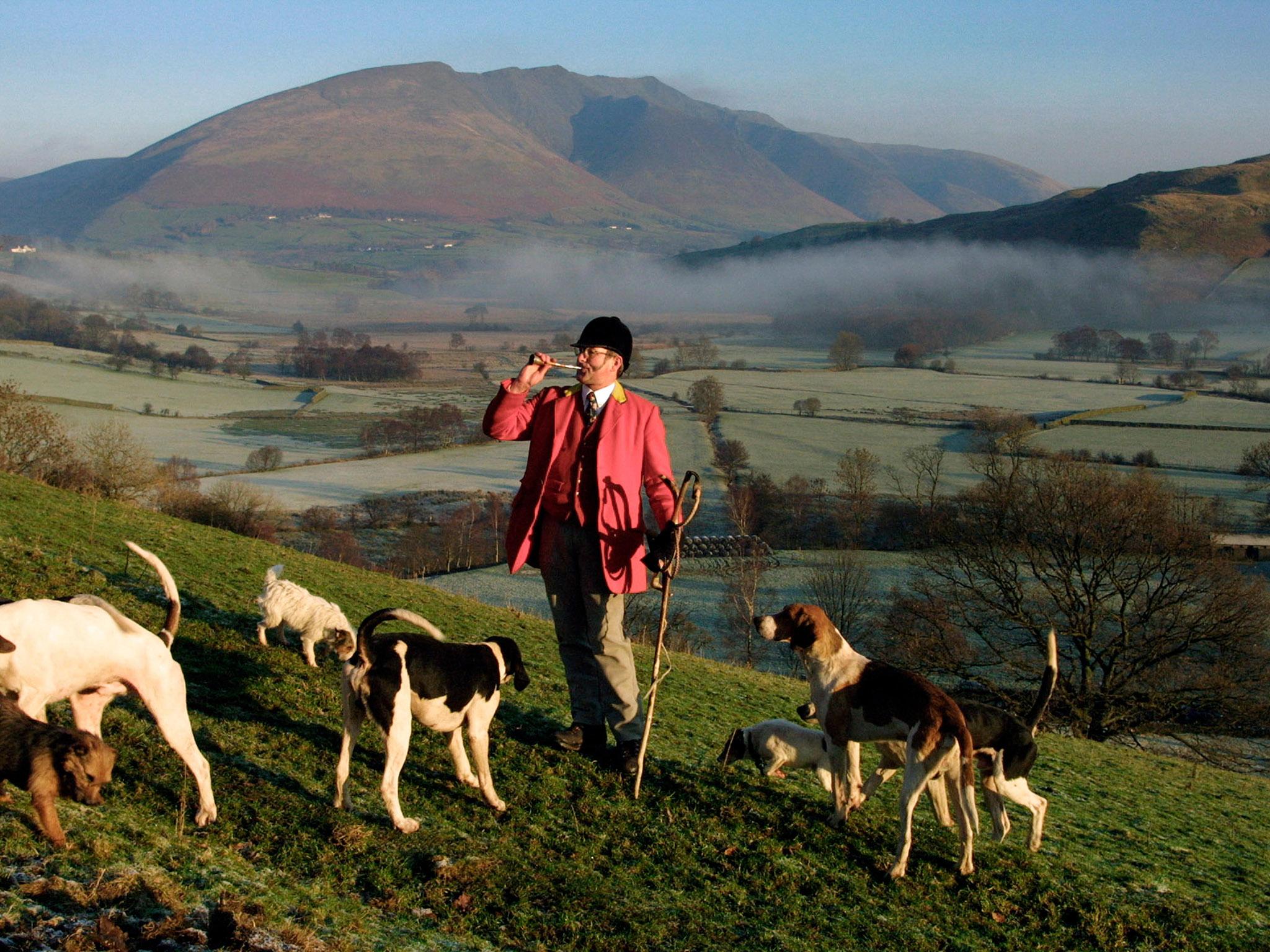
“About four years ago a fox was killed in front of my husband. The hounds appeared over the fell near our home, chasing this poor fox, which was absolutely exhausted. It got to the road and the hounds got to it. My husband got the fox but a hunt follower was there quickly and tried to grab what was left of the fox – it was dead and its entrails were out. But my husband wanted it for evidence. More followers arrived and tried to get the fox off him. In the end he had to relinquish it, but he was called all the things under the sun. As they were tussling with the body the hunter said, ‘I know what your game is. I know where you f-----g live, I’ll burn your house down’.”
It was that incident that changed the couple’s minds about living out their retirement in the Lake District. Before this year’s season could begin, they sold up and moved to Scotland. “I love the valley but we wanted to leave because of the hunt coming so regularly. We were absolutely sick of it. Hunting had a terrible impact on my life. I would never have moved there if I’d known this went on.”
Green wants to see “some sort of register” of places where hunt packs meet so that homebuyers will know which areas have local hunts – and they can avoid the pressure that comes with them.
“A lot of my neighbours didn’t like the hunting and felt intimidated. My elderly neighbour had a fox under her barn one new year. The hunt came straight into her garden and were banging on her back door wanting the key to her barn so they could get the fox. She wouldn’t give it to them but she was really frightened because they were very angry.”
Unlike Green, Pat Camber*, another homeowner, refuses to be driven away. “How can it be acceptable for law-abiding locals to feel forced out of their homes by antisocial, illegal activity that simply would not be tolerated on the streets of Penrith or Kendal? Just because our communities are small, remote and sparsely populated does not mean we should have to put up with this kind of behaviour for half the year.
“We regularly see foxes being pursued and/or killed, out-of-control hounds, digging out, quad bikes, no trails being laid, roads and gateways blocked, the whole hunt off paths and tearing across open terrain, and terrier use, to name but a few – all breaches of the licence, and many also illegal,” Pat says.
For some, trying to take a stand against local hunting comes at a personal cost. Jasmine Thomas*, a former pharmacist, says she is made physically ill – not just by knowing wildlife around her is being killed, but also by the threats she claims have been made against speaking out. “The hunts can appear at any time, which is just horrible. It gets louder as they come, your heart races, and I have to get the pets in and get indoors,” she says.
“We’ve had hounds in the garden and running riot right through the village. It’s a small hamlet, and we’ve seen foxes pursued through it. Quad bikes come, and men shout, blow horns, and vehicles go up and down as they try to work out where the fox has gone, then they disappear into the woodland around the houses and then the hounds get really excited. Then there’s an awful moment where it just goes silent and you know that’s the moment they make the kill. I nearly throw up every time.
“If the vehicles are coming because they’re following a fox that’s released – I say ‘released’ because I absolutely believe that’s what they do as they always manage to be chasing a fox in view of waiting roadside spectators – they’ll just abandon their vehicles and leap out and run to get the best view.
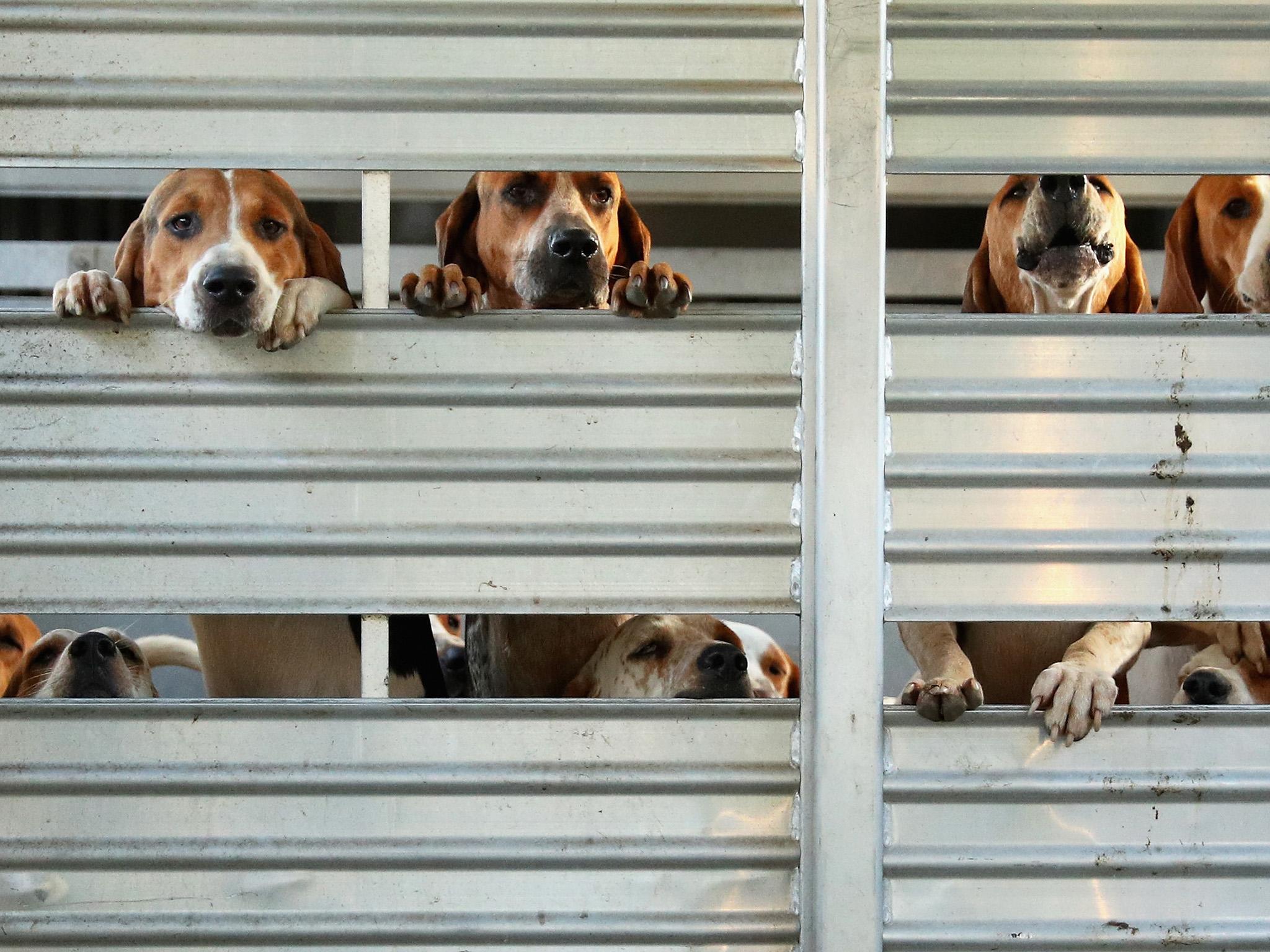
“I’ve been stuck in the middle of them when they’ve been doing that and it felt so frightening. You daren’t go out and film or confront them because there are so many of them. They are very intimidating. I used to go and try to take photos but now they know who I am I don’t feel safe doing that. It’s an awful choice – either you stay here, keep your head down, know what’s going on yet are unable to do anything about it, or you go out for the day, which means you’re then trying to plan your life around the activities of a bunch of criminals.”
These days, Thomas says, she always go out for the day if she thinks the hunt is coming – “and it dominates your life”.
She believes a lot of residents are wary of speaking out against the hunt because they’re afraid. “A lady near me has had people gesticulate and swear at her when she’s going about her business. I also have a friend who has been driven at while walking her dogs, because of her anti-hunt views.
“Many here feel they have to accept the hunts. Standing up to them in any way exposes you to threats and intimidation, and possibly worse.
“It affects me physically and psychologically. I can’t sleep, I get really stressed, I lose my appetite, I’m on edge all the time. If I had known what goes on, I wouldn’t have moved here.
“But I can’t afford to move. I love the area – I don’t want to be pushed out of my home by illegal activity. And if I move away, who’s going to stand up for what’s right?”
Those who do take a stand – hunt monitors and saboteurs or “sabs” – regularly come into conflict with foxhunts in most areas of the country that are popular rural hunting areas, from Devon to the Lakes. Few know this better than Billy Bland, 70, a farmer’s son who grew up steeped in hunting tradition but who changed his mind 20 years ago based on what he saw.
“You get brainwashed from day you’re born,” says Bland, who today is Cumbria’s highest-profile anti-hunt campaigner. “I kept hounds as a walker [when smaller hunts hand over puppies for fostering in summer and take them back in winter].
“I saw the way they treated them and started asking awkward questions, which they didn’t like. It was things like stringing foxes up in trees, making the hounds jump up at them, not feeding the hounds. They couldn’t care less about the hounds – they would rather shoot them than let you have them for the rest of their days.”
Bland regularly goes out as a hunt monitor, recording what activity goes on. He recounts how he was called by a follower of one pack “the worst man in the world” for turning against hunting, and recalls how another once told him: “If your mother and father were still alive they’d have you put down.” Hurtful words, but to Bland they are a sign he is successfully disrupting their outings.
Metcalfe resents the effect that the disruption had not just on her business but also on clients, and her animals and employees. “Customers were very upset when I had to cancel – 99.9% were holidaymakers who had planned their day around the ride, and there were often kids involved. I also had horses injured because when the hunts came, because in their panic they were caught in wire fencing or pulled ligaments tearing around; I had a member of staff who cracked his ribs when a horse went mad because of the hunt, pushing him up against a fence.
“No end of equipment such as head collars was broken, where horses broke free in a panic. It was a nightmare. A pony only 13 hands high (4ft 4in) hurt himself jumping a 5ft wall to try to escape the noise and chaos.
“I closed the business because I couldn’t bear it any more. It was my entire livelihood. I was left with no income but eight horses still to look after.”
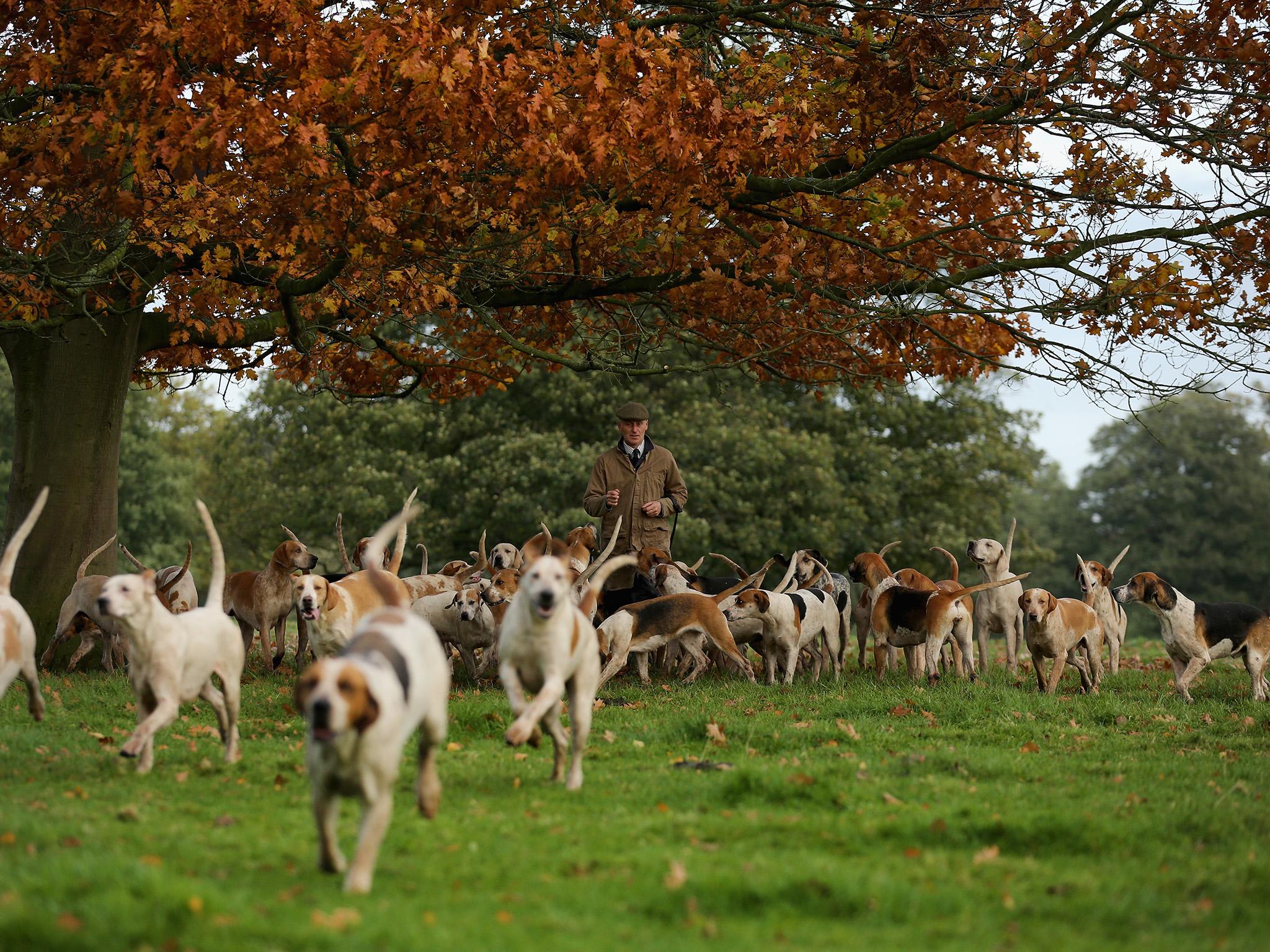
Metcalfe agrees with Thomas that although hunting is supported only by a minority of the community, few residents dare speak out for fear of repercussions. “It keeps going because of the intimidation,” she says. “There have been numerous times when witnesses who could have given evidence to the police, such as former employees, have said they want nothing to do with my case.”
She likens other people’s residents’ silence to the 1973 film The Wicker Man, in which locals on a remote island all flatly deny the existence of a missing girl while secretly indulging in bizarre pagan rituals. “It’s absolutely backward up here, just like The Wicker Man. Those of us who don’t support hunts are totally ostracised in the community.”
*
To get around the 2004 ban and stay within the law, hunt packs created the practice of trail hunting but villagers say evidence suggests it’s not happening, at least in the national park.
“Once I phoned the hunt master’s house to ask which way the hunt was going and was told they couldn’t say because it depended which way the fox ran – admitting they are not trail hunting,” Metcalfe recalls.
Green says: “If a trail had been laid, the hounds would be close together, going in the same direction, but they’re all over the fell, scattering about trying to detect where the fox went.
“We know they’re not laying fox urine because that comes from fur farms abroad, of which there are none in this country. And to import animal byproducts you need a certificate from the Animal and Plant Health Laboratory; so we did a Freedom of Information request asking whether any certificates had been issued for importing it, and none had. So either they aren’t bringing any in or they’re bringing it in illegally.
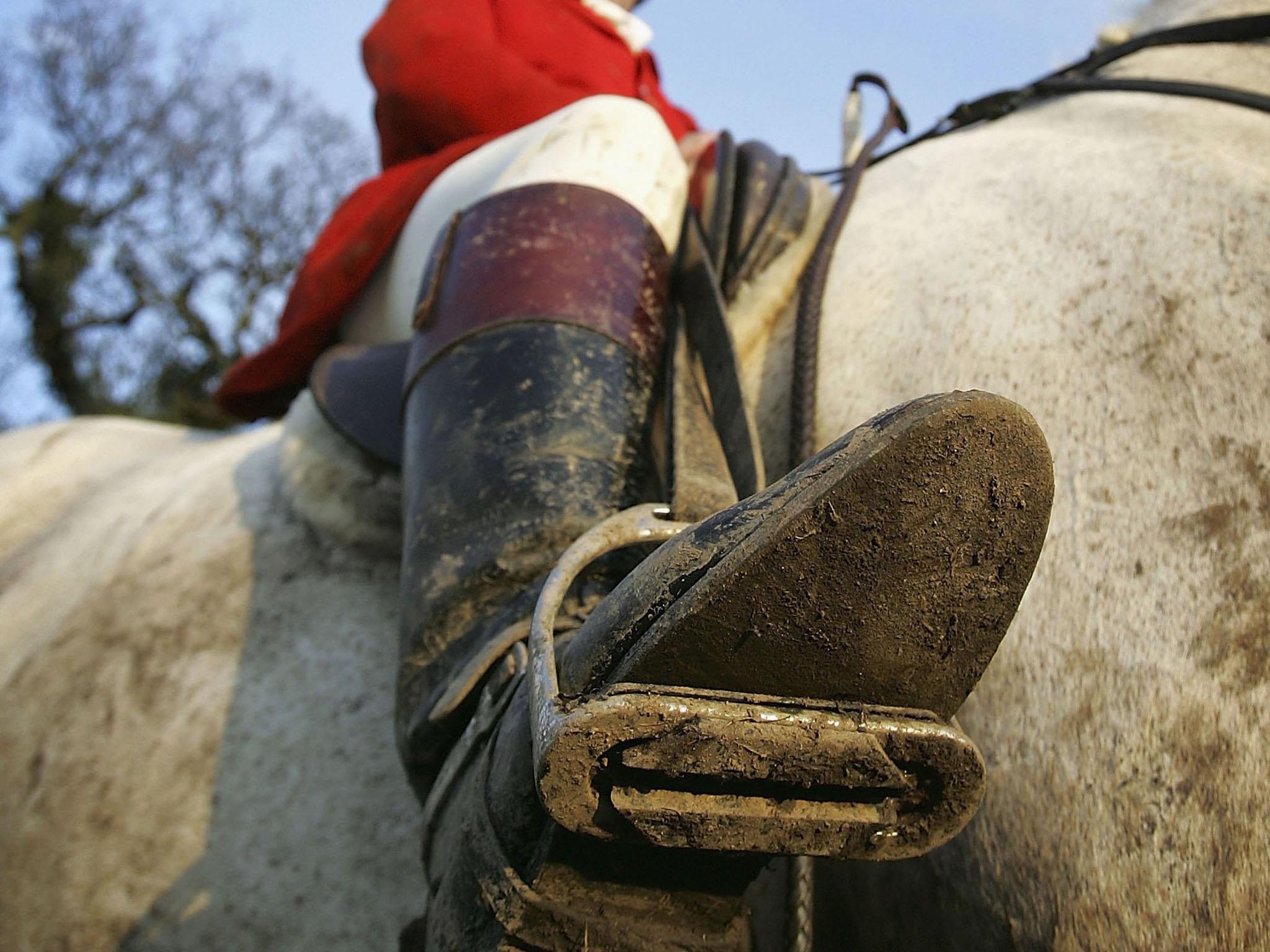
“One gallon of fox urine would do two half-hour trails. If they’re hunting from 9.30am to 3.30pm they’ll need six gallons. To hunt all day, three times a week for six months would need tonnes. And no laboratory in this country would be licenced to treat it. The trail hunting claims are all smoke and mirrors.”
Thomas believes the secrecy surrounding meets is also telling. She and her fellow opponents find it hard to get meet dates in advance. “If they’re following a trail, which is legal, why aren’t they still letting people know where they’re going to be when? And encouraging people to take part? Because that’s not what they’re doing. I’ve never seen any evidence of a trail being laid,” she says.
*
To chase foxes, hunts need land, and landowners must issue licences for trail hunting. Thomas says she has been intimidated for lobbying landowners not to issue licences. “The year before last somebody came hammering on my door demanding to know who the hell I thought I was, telling me if I came to live in a place like this I had to accept what goes on. I’d complained to the landowner. Once he’d gone, I was absolutely in bits and felt really intimidated. I found it really frightening. I was physically shaking. It left me feeling vulnerable, in such a remote place.
“I keep my head down now, and I feel ostracised. I don’t go in any pubs because they all hold hunt meets – under the guise of a ‘coffee morning’ followed by ‘trail hunting’.
“The landowners licencing the hunts won’t take any notice of all the reports they get that this is illegal. They won’t take my word against the hunts’.”
The influence of hunts is so widespread, and involves so many varied professions, that any landowners who refused licences would be unable to call on tradespeople for work on their properties and estates, Thomas says. “You see vans parked for meets with logos of electricians, plumbers, builders – all sorts take part. It’s shocking,” she says.
The National Trust – one of the Lake District’s biggest landowners has issued new regulations on trail hunting, including banning animal-based scents, in response to October’s members’ vote, which is seen as an attempt to head off a ban on trust land.
United Utilities – the other large landowner in the national park – would be unaffected by the trust's ban, leaving hunts free to continue their activities, residents fear.
To try to show it takes claims of violence seriously, the trust also points to the fact that last year it suspended for 24 hours the licence of the Melbreak Hunt in Cumbria following a “serious assault on a hunt monitor”. Two monitors had been threatened, one of them – an elderly man – having his nose broken.
*
The actions of the police in trying to enforce the 2004 Hunting Act, which banned the hunting of wild mammals with dogs, are widely derided by the anti-hunt fraternity around Britain, who doubt the sincerity of their efforts. However, some flouting the law are indeed prosecuted: since the ban took effect in 2005, 423 people were convicted under it in England and Wales, according to Ministry of Justice figures.
But the figure may seem low, and lower still when you consider that the Countryside Alliance says that only 24 of those cases involved members of registered hunts. Perhaps it’s no surprise: when the legislation came into force, senior police chiefs themselves warned that the ban would be unenforceable, and the CA warned then that the police had been “placed in an impossible situation”.
When Metcalfe turned to the police, she found no support, she says. “When I call the police I’m told, ‘You can’t stop hounds chasing foxes’.
“The lecture I got was that hounds have hunted foxes for centuries, and if they come across a fox scent during a trail hunt, nothing would stop them pursuing the fox. I would have to prove beyond doubt that the huntsmen had made no attempt to call the hounds off, which, he told me, would be impossible.
“It wouldn’t surprise me if the police have been given instructions not to pursue charges regarding offences concerning the Hunting Act.”
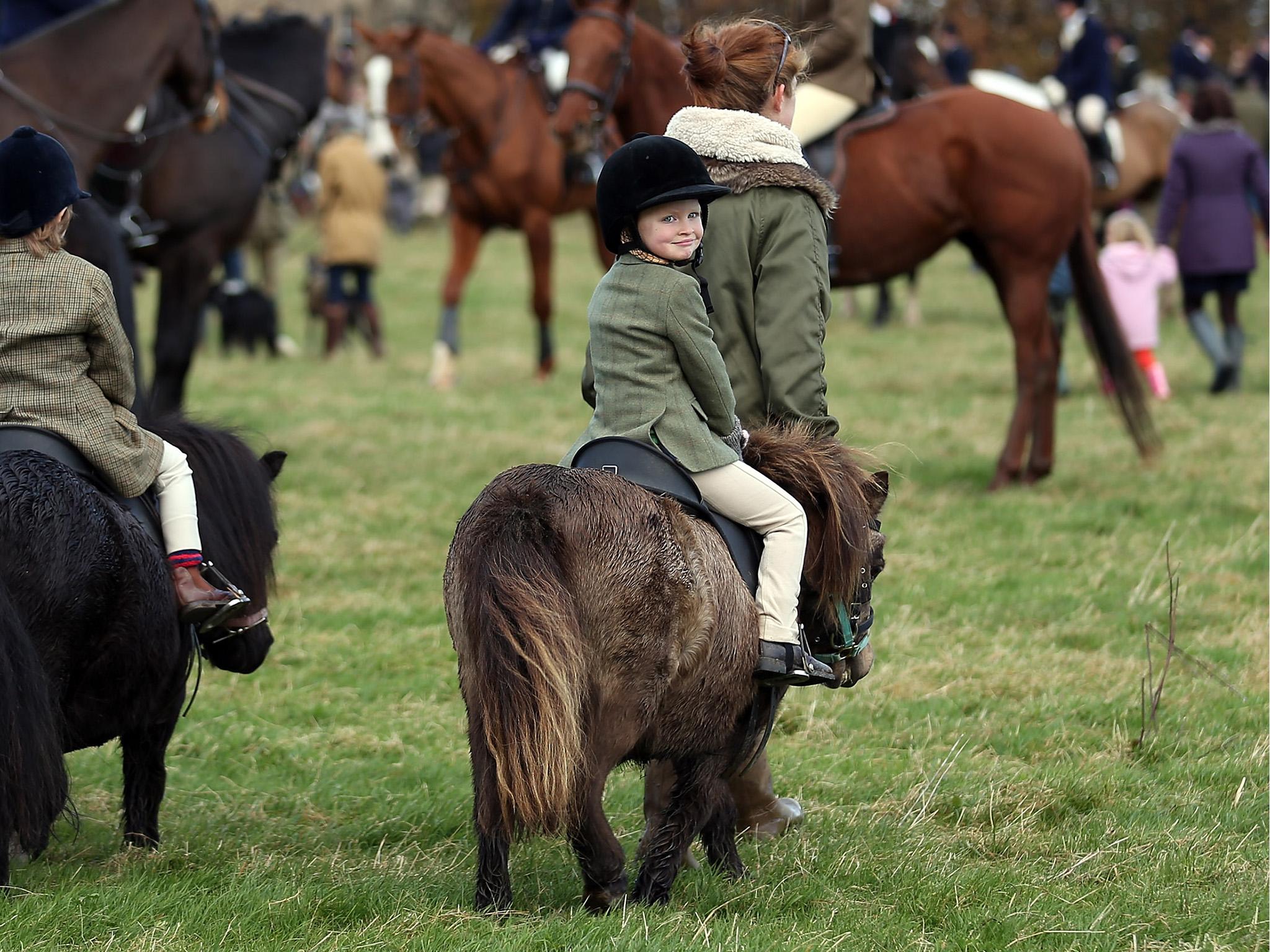
Thomas has a similar experience. “It’s like living in a lawless part of the country. We cannot seem to get anybody to do anything about it.”
She and Green have both had so many meetings with police that they gave up. “We didn’t even ring them in the end,” recalls Green. “We had no recourse to the law. We saw foxes being chased down the fell and rang the police, and by the time they arrived, it was all over. It’s just not a priority. There was a ‘hunt liaison officer’ – what a joke. Do they have a burglar liaison officer?
“I started reporting the mobs as antisocial behaviour. We said to the police, ‘If we told you there were 30 cars full of hoodies, your response would be very different.’ And actually the hoodies would probably be much better behaved than this lot.
“I also believe there’s a police officer who joins in illegal fox-hunting so how can they police it? I used to have great respect for the police and felt you could always rely on them, and I don’t feel that now.”
Cumbria Constabulary ran an operation called Operation Kilowatt against hunting three years ago, but Bland lost faith in it when “the police used to turn up and I saw them just passing the time of day with the hunters”.
He says he was threatened one day as I was trying to film a hunt. “This fellow was trying to block my view in a pick-up. He got on his CB radio saying ‘I’ve got Billy in the gorse bushes, he wants learning a lesson.’ I felt threatened so I rang 999 and nobody came. I had two calls from police HQ and I could hear them talking in the background but nobody came to the phone. Then they apologised for not coming – they had no intention of coming.”
Bland says he has lost count of how many formal statements he has given to police. “I’ve had meeting after meeting with them. A lot of cases we present [evidence such as videos and photographs] to them, they do their best to let them off. They lose the evidence, then it gets to six months and they say ‘No, it’s time-barred’.” By law, magistrates’ court cases must be heard within six months of the offence.
“To me they are clearly protecting the hunters. I honestly think it came from government when the Act was passed,” Bland says.
Thomas sums up the frustration of many rural residents. “It’s a sense of utter helplessness that these people are breaking the law, not doing a little bit of harmless vandalism, they’re killing wild animals, with packs of dogs – for fun; they’re doing it right outside your house, and there’s nothing you can do. If the police come at all, they’re 40 minutes away and it’s usually too late when they arrive. If they do turn up in time, they say to the hunt, ‘We had a report of illegal hunting’ and the hunts say ‘Who – me, sir? No, sir’ and the police seem to say, ‘Oh that’s all right then’.”
*
The Home Office denies having advised police not to prosecute. A spokeswoman said: “We haven’t sent any guidance to police. It’s an independent operational decision for police forces on how to respond to reports of criminal activity.”
But the League Against Cruel Sports believes more could be done to crack down, and says reports of hunting are rising, with greater numbers than ever last season reporting illegal activity to its “animal crimewatch” line.
In a new report, the league has outlined the damaging environmental effects of both fox hunting and trail hunting, and how they damage vegetation and affect habitats for a variety of wildlife and protected species, with activities such as blocking up badger setts. If animal urine trails are laid, the report says, they pollute the countryside.
On sourcing fox urine, the report claims: “It is likely imports may be illegal as hunts are unlikely to have acquired the appropriate permits. If, however, hunts claim to have sourced fox urine from the UK, they would have to source this from live foxes held captive, and as such they would become protected animals [by law], and require a special licence.”
The league agrees with those who say the level of proof needed to prosecute under the Hunting Act is higher than for most crimes. A spokeswoman said: “When it comes to other crimes, reasonable suspicion of someone committing a crime would normally trigger an investigation. And when the person claimed not to have done it, the investigator would not necessarily believe them, so would carry on looking for evidence. In the case of hunting, the same situation – where a person denied having anything to do with the crime – would probably lead to the investigator dropping the case.
“Therefore organisations like us are expected to produce far more evidence to trigger an investigation than other crimes.” The league wants the Hunting Act strengthened in areas including a new “reckless” clause to stop “trail-hunters” saying foxes are killed accidentally; a ban on the use of dogs underground and greater sentencing powers.
The hunt in the area where Metcalfe had her business, did not respond to message requests for comment. The Countryside Alliance pointed to its statement on the National Trust vote, which urges members to vote against a ban on its land. It said: “There are currently more than 60 hunts that apply for a licence to enable them access to National Trust land, but if this motion carries at the AGM, a number of these hunts may no longer be viable due to a lack of country.”
The CA declined to comment on householders’ reports of disruption to their lives, homes and livelihoods, and claims of law-breaking by hunting foxes. It also refused to say where materials for laying trails are sourced.
The Masters of Foxhounds Association was approached for a comment but declined to respond, as did the National Trust.
A spokesman for Cumbria Constabulary said: “We take all reports of wildlife crime seriously, especially as we serve a rural area. We have a designated wildlife officer for the force to ensure a consistent, professional and proportionate response to all incidents, in addition to planning proactive and preventative initiatives. We routinely work alongside partner agencies throughout the year including specific campaigns and operations to deal with all offences in relation to illegal hunting and related activity.
“We encourage that people report any illegal activity, and with evidence we will investigate these reports and bring those who commit crimes to justice. We also welcome anyone with any concerns, information or intelligence to get in touch. Anyone with information can report this to police on 101.” To some, that advice may ring rather hollow.
*Some names have been changed
Join our commenting forum
Join thought-provoking conversations, follow other Independent readers and see their replies
Comments